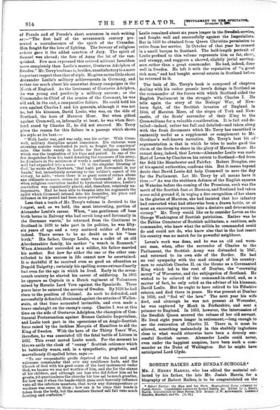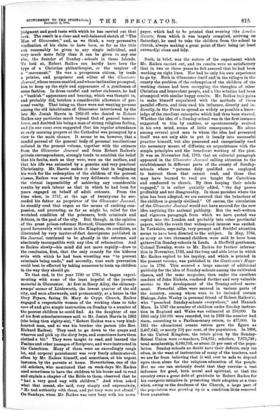ROBERT RAIKES AND SUNDAY-SCHOOLS.*
MR. J. HENRY HARRIS, who has edited the material col- lected by his father, the late Mr. Josiah Harris, for a biography of Robert Raikes, is to be congratulated on the • Robert Rafters: the Man and his Work. Biographical Notes collected by Josiah Harris. Unpublished Letters by Robert Raikes, die. Edited by J. Henry. Harris. Introduction by Dean Farrar, D.D. Bristol : J. W. Amoy/smith. London zr Simpkin, Marshall, and Co. Lis. ed.] judgment and good taste with which he has carried out that task. The result is a clear and well-balanced sketch of "The Man of Gloucester," and, as we think, a very persuasive vindication of his claim to have been, so far as the title can reasonably be given to any single individual, and very much more fully than it can be given to any one else, the founder of Sunday - schools in these Islands. To look at, Robert Raikes can hardly have been the type of a Christian philanthropist, or the inspirer of "movement." He was a prosperous citizen, by trade a printer, and proprietor and editor of the Gloucester Journal, whose means enabled, and whose inclination prompted, him to keep up the style and appearance of a gentleman of some fashion. In dress careful and rather elaborate, he had " backish " appearance and bearing, which was thought to, and probably did, betoken a considerable allowance of per- sonal vanity. That being co, there were not wanting persons among the old inhabitants of Gloucester interviewed by the late Mr. Josiah Harris in 1862-63 who denied to Robert Raikes any particular merit beyond that of general benevo- lence, and doubted his being a man of strong religious feeling, and (in one case) even suggested that his regular attendance at early morning prayers at the Cathedral was prompted by a view to the main chance. It seems to us, however, that a candid perusal of the general body of personal recollections collated in the present volume, together with the extracts from the Gloucester Journal and from Robert Raikes'a private correspondence, strongly tends to establish the belief that his faults, such as they were, were on the surface, and that his life was animated by a genuine and very practical Christianity. Mr. Harris makes it clear that in beginning his work for the redemption of the children of the poorest classes, Raikes was moved by very deliberate reflection on the virtual impossibility of aahieving any considerable results by such labour as that in which he had been for years engaged on behalf of adult outcasts. From the time when, in 1757, at the age of twenty-one he suc- ceeded his father as proprietor of the Gloucester Journal, he steadily used that organ as the means of exciting com- passion, and procuring, as far as might be, relief for the wretched condition of the prisoners, both criminals and debtors, in the gaol of the city. But though, in the opinion of the great prison-reformer Howard, Gloucester Gaol com- pared favourably with most in the Kingdom, its condition, as illustrated by very matter-of-fact descriptions published in the Journal, continued to be ghastly in the extreme, and absolutely incompatible with any idea of reformation. And so Raikes slowly—his mind did not move rapidly—drew to the conclusion, first, that the only remedy for the hideous evils with which he had been wrestling was "to prevent criminals being made," and secondly, that such prevention could best be effected by taking measures to train up children in the way they should go.
To that end, in the year 1780 or 1781, be began experi- menting with some of the least hopeful of the juvenile material in Gloucester. At first in Sooty Alley, the chimney- sweeps' corner of Littleworth, the lowest quarter of the old city, and soon afterwards, and permanently, at a house in the Grey Fryars, facing St. Mary de Crypt Church, Raikes engaged a respectable woman of the working class to take care of and give simple instruction on Sunday to a number of the poorest children he could find. As the daughter of one of his first schoolmistresses said to Mr. Josiah Harris in 1862 (she being then eighty-six), "Robert Raikes was a very kind- hearted man, and so was his brother the parson (the Rev. Richard Raikes). They used to go down to the quays and wharves and pick up the dirty boys, and sometimes have them clothed a bit." They were taught to read, and learned the Psalms and other passages of Scripture, and were instructed in the Catechism. Many of them were an exceedingly rough lot, and corporal punishment was very freely administered, often by Mr. Raikes himself, and sometimes, at his urgent instance, by the parents at home. Nevertheless, one of the old scholars, who mentioned that on week-days Mr. Raikes used sometimes to have the children to his house and to read and explain a chapter of the Bible to them, observed that he "had a very good way with children" And when asked what that meant, she said, very simply and expressively, "He had authority with them, and yet they were not afraid." On Sundays, when Mr. Raikes was very busy with his news. paper, which had to be printed that evening (the London Ga:ette, from which it was largely compiled, arriving on Saturday), he used to take the children from the school to church, always making a great point of their being (at least outwardly) clean and tidy.
Such, in brief, was the nature of the experiment which Mr. Raikes carried out, and its results were so satisfactory that in two or three years he felt assured that he bad been working on right lines. Nor had he only his own experience to go by. Both in Gloucester itself and in the villages in the county the problem of the redemption of the children of the working classes had been occupying the thoughts of other Christian and benevolent people, and a like solution had been attempted with similar happy results. Mr. Raikes took pains to make himself acquainted with the methods of these parallel efforts, and then used his influence, directly and in- directly, in the Press to spread as widely as possible a know- ledge of the excellent enterprise which had thus been started. Whether the idea of a Sunday-school was in the first instance suggested to him by another, or spontaneously evolved in his own mind, seems of little consequence. He alone among several good men to whom the idea had presented itself was not only able to put it locally into successful practice himself, but also possessed and energetically used the necessary means of diffusing an acquaintance with the simple principles and the beneficent working of the plan. It was on November 3rd, 1783, that an editorial paragraph appeared in the Gloucester Journal calling attention to the establishment in different parts of the county of Sunday- schools where "persons duly qualified are employed to instruct those that cannot read, and those that may have learned to read are taught the Catechism and conducted to church. By thus keeping their minds engaged," it is rather quaintly added, " the day passes profitably and not disagreeably. In those parishes where the plan has been adopted, we are assured that the behaviour of the children is greatly civilised." Of course, the circulation of the Gloucester Journal would not have secured for the new idea anything like national publicity. But the well-written and vigorous paragraph from which we have quoted was copied into the London and probably into other provincial papers, with the result that widespread interest was excited. In Yorkshire, especially, very prompt and fruitful attention seems to have been directed to the subject. In May, 1784, as many as two thousand children were said to have been gathered in Sunday-schools in Leeds. A Sheffield gentleman, Colonel Townley, wrote to Mr. Raikes for further informa- tion in November, 1783, and the long and able letter in which Mr. Raikes replied to his inquiry, and which is printed in the present volume, was published in the Gentleman's Maga- zine in 1781. This secured a large amount of additional publicity for the idea of Sunday-schools among the cultivated classes, and the same magazine, then under the excellent conduct of John Nichols, rendered further and very valuable service to the development of the Sunday-school move- ment. Powerful allies were secured in various parts of the country, among whom were to be included certain Bishops, John Wesley (a personal friend of Robert Raikes's), who "preached Sunday-schools everywhere," and Hannah More. In 1787 the number of children under Sunday instruc- tion in England and Wales was estimated at 250,000. In 1800 only 156,000 were recorded, but in 1818 the number had risen, according to a Parliamentary return, to 477,000. In 1851 the educational census return gave the figure as 2,407,642, or nearly 13/ per cent, of the population. In 1898, for the United Kingdom, the totals given by the Sunday- School Union were a—teachers, 704,955; scholars, 7,875,748; total membership, 8,580,703, or about 25 per cent of the popu- lation. Sunday-schools no doubt have their defects, only too often, in the want of instruction of many of the teachers, and we are far from believing that it will ever be safe to depend upon them alone for the religions education of the people. But no one can seriously doubt that they exercise a vast influence for good, both moral and spiritual, or that the country owes a great debt of gratitude to Robert Raikes for his energetic initiative in promoting their adoption at a time when, owing to the deadness of the Church, a large part of the population was growing up in a condition little removed from paganism.























































 Previous page
Previous page